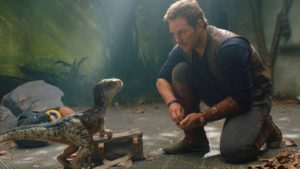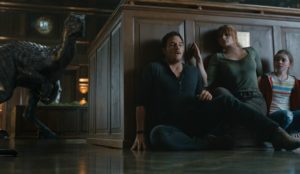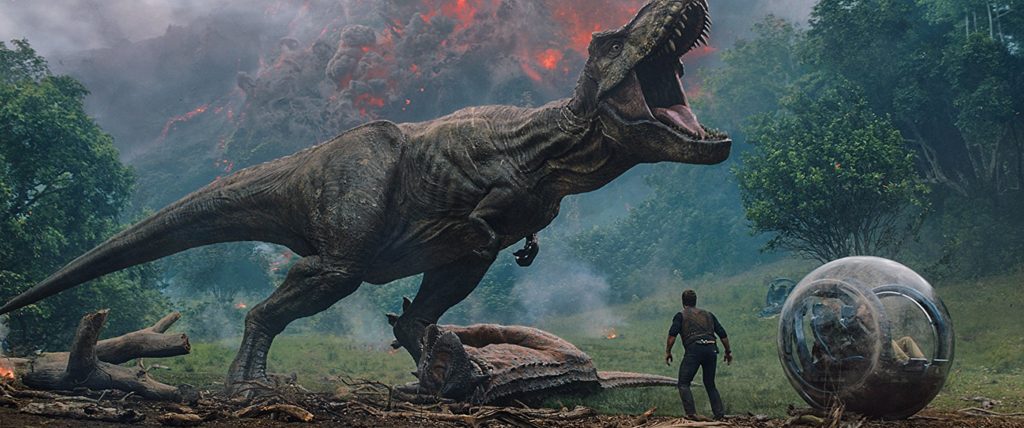“Jurassic World: Fallen Kingdom” is more connected to its source material and a sense of morals than its predecessor, and that alone may be enough to make up for what is becoming a tiresome franchise along with shameless marketing ploys. It introduces us to characters we’re used to seeing and some new ones as well; even though we’ve seen these types before: The billionaire, the hunter, the profiteer(s). And then we have the dedicated animalist Owen (Chris Pratt) and his estranged girlfriend Claire (Bryce Dallas Howard), who, amidst a film of profiteers and fraudsters attempt to do the right thing. Of 2015’s “Jurassic World” I said the film “takes previous iterations and throws them out the window.” I was wrong. It didn’t. This one does; though in a deeper way than its makers may have intended while angling for a casual summer blockbuster.
I’ll say this about “Fallen Kingdom:” it’s actually scary. The film is rated PG-13, as was “Jurassic World.” But its themes are darker, its cinematography more focused, and its scope elemental. This is not a film about a dinosaur-themed park and the awe and wonder that brings. This is a cautionary tale, both of the danger of human hubris, and of a cataclysmic event more singular than its promised volcanic eruption on a dinosaur-populated island. Its early scenes are filled with sadness and a peek at an extinction event we weren’t privy to 65 million years ago. But it foreshadows implications for its humans, who have begun down a dark and dangerous road. Heck, they may have even cut the brakes first.
The film tasks Dallas Howard and Pratt even more this time, and they deliver. Director J.A. Bayona wisely cuts off much of the wisecracking and sexual tension between the two, and pits them together as two people who care for each other and a group of dinosaurs who could quickly become extinct if the volcano goes off. Claire must convince Owen to come along for a rescue op; but of course it’s not much of a challenge. The velociraptor he bonded with during “Jurassic World” – ‘Blue’ – is among the dinosaurs set to be wiped out.
 What works about the production is it takes a legacy of movies stretching back to 1993, filled with malfunctioning parks and dinosaurs eating humans and does something remarkable – it makes you care about these creatures’ survival. It accomplishes this with its doleful score (reprised by John Williams) and images that stay with you. One of the best shows a lone brachiosaurus eclipsed in smoke and ash near the shores of the island as a boat sails away, its silhouette fading like a memory from another time. Note: This is a hard film to review without spoilers, but I will try. As such, what happens to the dinosaurs on the island, and what this departing boat represents will remain hidden, to be revealed upon seeing the movie only.
What works about the production is it takes a legacy of movies stretching back to 1993, filled with malfunctioning parks and dinosaurs eating humans and does something remarkable – it makes you care about these creatures’ survival. It accomplishes this with its doleful score (reprised by John Williams) and images that stay with you. One of the best shows a lone brachiosaurus eclipsed in smoke and ash near the shores of the island as a boat sails away, its silhouette fading like a memory from another time. Note: This is a hard film to review without spoilers, but I will try. As such, what happens to the dinosaurs on the island, and what this departing boat represents will remain hidden, to be revealed upon seeing the movie only.
What about its high parts? Oh, the visual effects are a marvel, all the way from the exploding volcano (exploding is the right word. This is not an eruption on par with the likes of “Dante’s Peak.” The mountain literally explodes, and its quite a marvel to watch) to the dinosaurs themselves, which combine segments of three major periods of natural history and pits them against an extinction event together for the first time, ever.
The acting is good when it wants to be, but clichéd when it must. Dallas Howard and Pratt, along with two youthful adventurers (Daniela Pineda, Justice Smith), perform well, and the film mixes in a lot of twists, scenes of female empowerment, and emotion between its heroes in the right places. A young girl (Isabella Sermon) also has some nice scenes, though she is victim to a plot device that could have been written out entirely with no loss to the film whatsoever. Jeff Goldblum makes an appearance, but he’s more a narrator to a set of events that are explained in visuals long before he explains them in speech. More or less, he’s wasted here. James Cromwell makes an appearance also, but fades into the background similarly.
 The villains are plentiful, and range from corrupt state Senators to careless businessmen to unscrupulous geneticists. They want to exploit and weaponize the dinosaurs, and are played extremely one-sidedly by actors such as B.D. Wong, Ted Levine, Toby Jones, and Rafe Spall. A velociraptor maims a mercenary on the island, and another’s arm is torn off by a dinosaur later in the film. But, for their greed, carelessness, and complete lack of concern for human life, the most vicious creatures in “Fallen Kingdom” are the humans that inhabit it.
The villains are plentiful, and range from corrupt state Senators to careless businessmen to unscrupulous geneticists. They want to exploit and weaponize the dinosaurs, and are played extremely one-sidedly by actors such as B.D. Wong, Ted Levine, Toby Jones, and Rafe Spall. A velociraptor maims a mercenary on the island, and another’s arm is torn off by a dinosaur later in the film. But, for their greed, carelessness, and complete lack of concern for human life, the most vicious creatures in “Fallen Kingdom” are the humans that inhabit it.
The film makes the not-so-subtle case for the folly of unchecked human progress and the dangers of harnessing powers we can’t fully comprehend. The ones who know better are shoved aside. At the detonation of the test of the first Atomic bomb, chief architect J. Robert Oppenheimer recalled the words of Bhagavad Gita: “Now I am become Death, the destroyer of worlds.” Similar feelings are evoked here. Ultimately it’s a child who controls the use of this power; her decisions have far reaching implications.
At “Fallen Kingdom’s” conclusion, I found myself surprised. Its generic predecessor set me up for an expectation that failed to come true. Yes, it’s a summer blockbuster, a cash-grab, an exploitation of a franchise that should probably have ended years ago. But it’s well-constructed, dangerous, and thoughtful. No, it doesn’t surpass the original. But it might be the smartest “Jurassic Park” film since its inception. That in itself may be its saving grace.
– by Mark Ziobro


